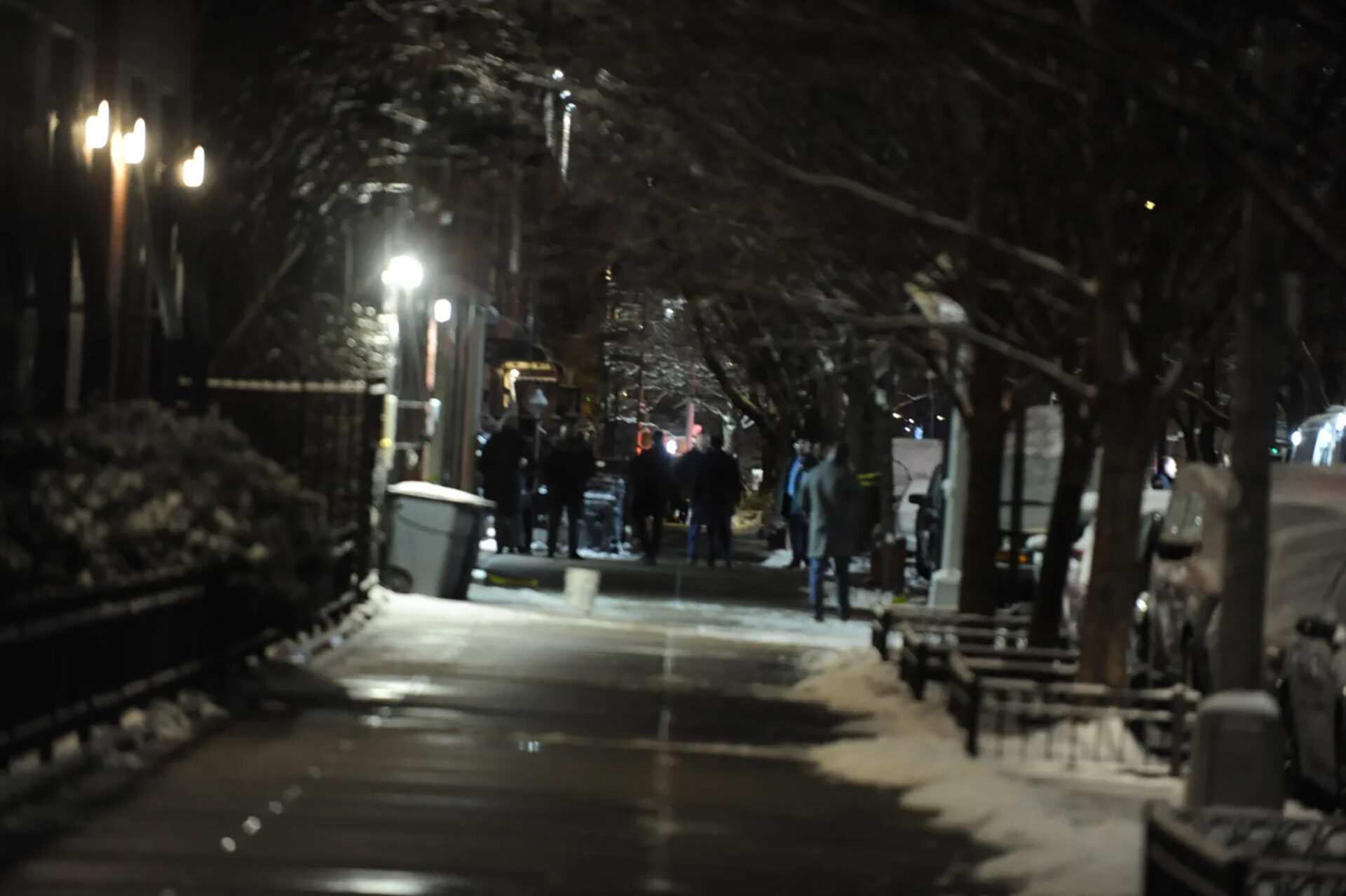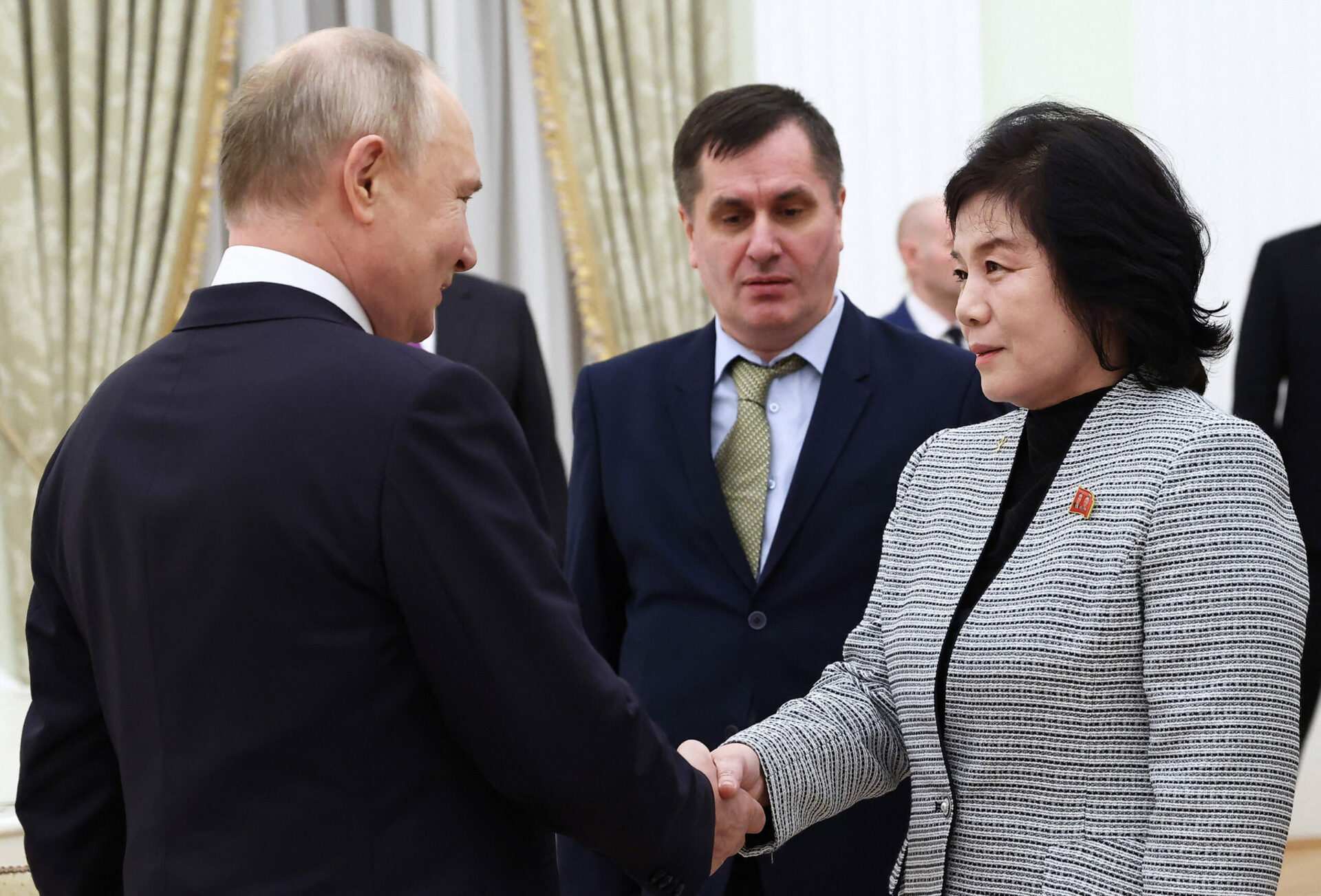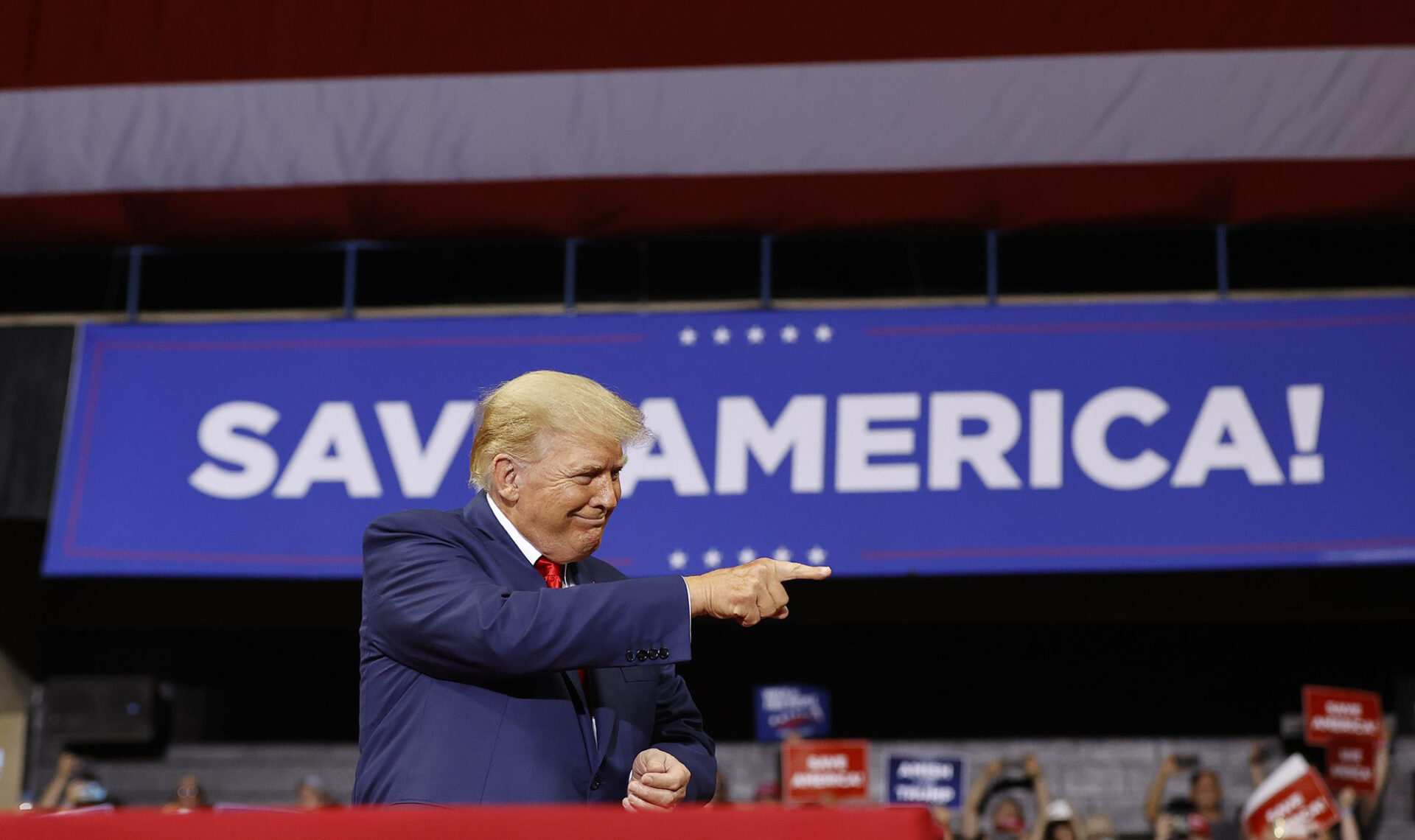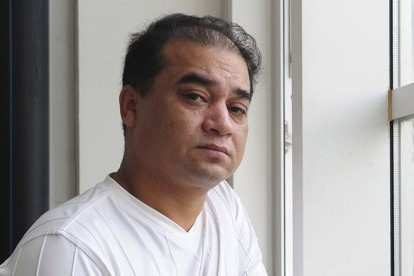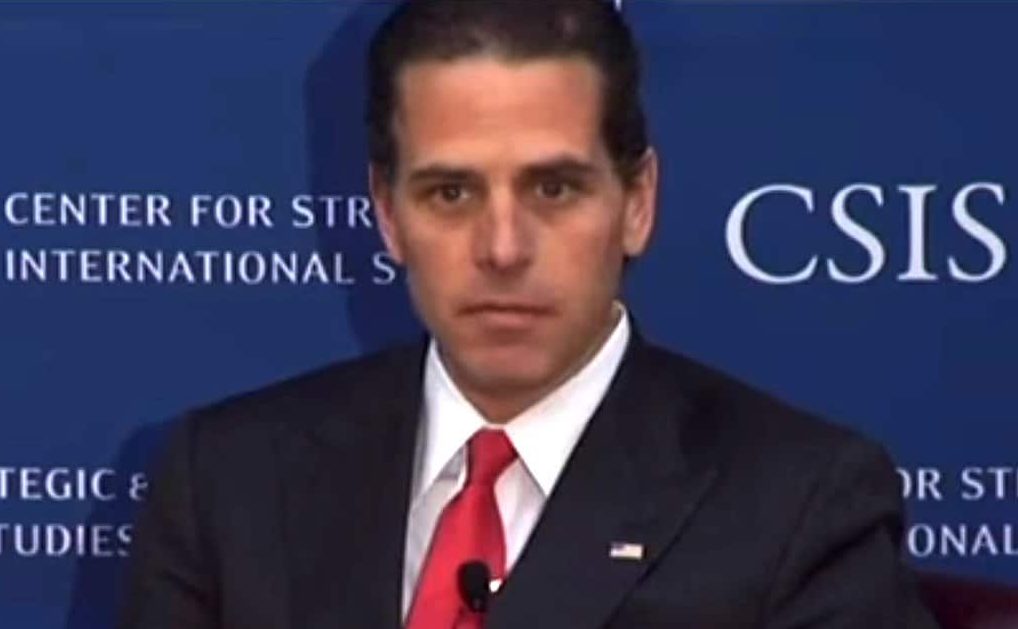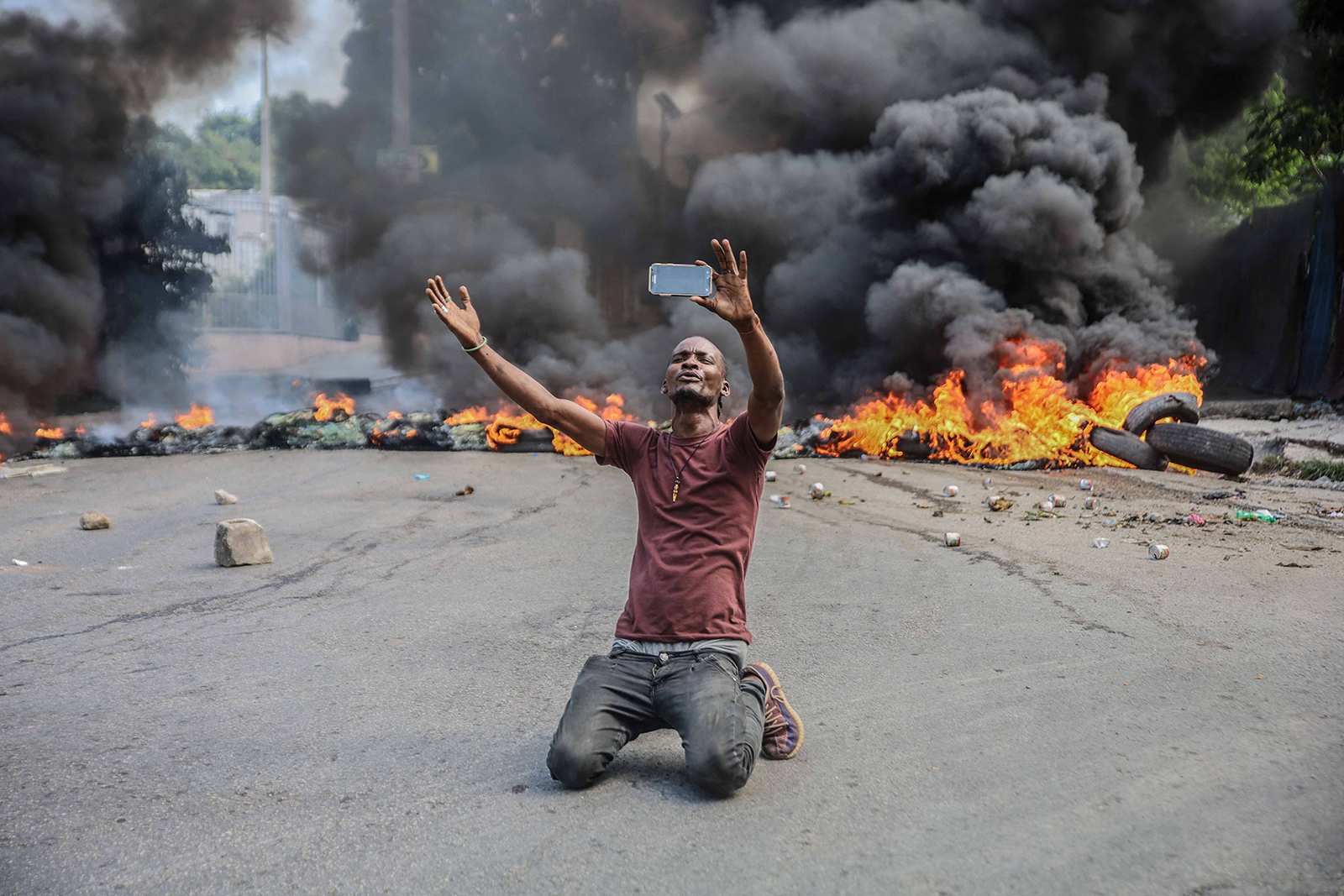
As a dozen kidnapped adults and five children with a U.S.-based missionary group marked their 10th day in captivity in a secluded location somewhere east of Haiti’s capital in October 2021, inside the country’s National Penitentiary the leader of the gang holding them hostage was toasting his birthday.
With “Happy Birthday” playing to Haitian konpa beats, a designer-clad Germine Joly, known as “Yonyon,” moved to the music, showing off his gold chains as a video camera panned to his black and yellow Fendi ensemble along with his hat, socks, shoes and a small bag swinging from his hip with the brand’s name emblazoned on them.
One of Haiti’s most notorious gangsters, Joly wasn’t just enjoying the good life behind bars. He was also directing his kidnapping gang’s criminal operations and hostage negotiations, according to U.S. authorities. After being extradited to the United States on board a Learjet in May 2022, Joly, 30, now faces a jury trial in federal court in Washington, D.C.
He’s charged with four dozen counts related to the smuggling of firearms to Haiti, in violation of U.S. export laws, and the laundering of kidnapping ransoms to support his gang’s violence. The weapons included AK-47 and M1A rifles, along with ammunition capable of piercing police cars. The arms were purchased from gun dealers in Miami and elsewhere in Florida with the help of “straw buyers” and proceeds from ransom payments, according to an indictment filed in July 2022, two months after initial charges against him were unsealed.
With jury selection scheduled to begin Wednesday, Joly faces a maximum sentence of up to 20 years on the most serious charge, exporting firearms to Haiti without the proper U.S. license. Though not on trial for the brazen kidnapping of 16 Americans and one Canadian with Ohio-based Christian Aid Ministries, the abduction is an important part of the government’s prosecution as the U.S. seeks to send a message about the gang-related violence that has been rocking Haiti.
The trial is expected to offer a window into the way in which Haiti’s armed groups operate. With an estimated 200 armed groups fighting over territory, the United Nations estimates that violent gangs only control about 80% of the Haitian capital and are now spreading to the countryside.
The trial is also expected to show the nexus between Haiti’s gun trafficking from the U.S. and gang violence and kidnappings.
“If you just talk about the gunrunning, that violence that’s in Haiti, it spills over into the United States,” said Walter Norkin, a former assistant U.S. attorney who is not involved in the case and currently serves as a partner with Akrivis Law Group in Miami.
“There are Haitian communities throughout the United States that are affected by it,” Norkin said. “We are supplying the guns that are used for crimes and everybody should care about that. We shouldn’t be doing that.”
High-profile case
At least seven leaders of five Haiti-based gangs are wanted by the FBI and face charges in the U.S. for their kidnappings of U.S. citizens since 2021, including the armed kidnappings of the missionaries, who were abducted at gunpoint on Oct. 16, 2021, as they returned from visiting an orphanage. The first of the gang leaders to be transferred to the U.S., Joly is also the most high-profile to be put on trial.
He was charged along with three other Florida residents who were in contact with him and were indicted on charges of receiving wire payments and engaging in straw purchases of firearms that were then smuggled or attempted to be smuggled to Haiti to benefit the gang 400 Mawozo in its kidnappings, killings and exhortation rackets.
Among those arrested is Eliande Tunis, a Pompano Beach resident and U.S. citizen. She was supposed to join Joly as a co-defendant on Wednesday but is now expected to plead guilty before jury selection starts to the 48-count indictment. She faces up to life in prison.
Tunis is described as a member of 400 Mawozo in the criminal complaint and prosecutors now accuse her of destroying 441 texts, audio messages and photos from her communications with Joly; 128 messages from his No. 2, Lanmò Sanjou, also known as Joseph Wilson, and 174 messages with the two other defendants.
Described as the alleged “girlfriend of one or possibly multiple senior figures in the gan,” by a United Nations panel looking into arms trafficking in Haiti, Tunis was arrested along with Jocelyn Dor and Walder St. Louis, both Haitian nationals. Tunis’ defense attorney late last week filed a motion with U.S. District Court Judge John D. Bates for a change of plea.
In October, Dor agreed to plead guilty to six charges, including receiving wire transfers from Haiti and a $15,000 deposit into his bank account from Tunis, to purchase several rifles to be shipped to Haiti. The most serious charge, violating the U.S. Export Control Reform Act when he sought to export guns to Haiti without the proper license, carries a maximum sentence of up to 20 years and a fine of up to $1 million.
On the eve of the trial, it was not clear if St. Louis, the fourth defendant and a Miami resident, is going to face trial or cut a plea deal, because the court records does not show his status. The Florida residents’ relationship with Joly and 400 Mawozo surfaced during the FBI’s investigation into the kidnapping of the missionaries.
Before the start of trial, Joly, along with Tunis, tried to suppress statements made to law enforcement, evidence related to 400 Mawozo and its kidnappings, and evidence relating to the missionaries’ kidnapping. The judge denied the defense requests.
The court ruled that while even though the defendants are not charged with kidnappings, “the defendants’ connection to 400 Mawozo underlies much, if not all, of the evidence at issue, and the Court finds that evidence of this connection is intrinsic to the overall case.”
“The government must prove that defendants purchased the firearms with proceeds from 400 Mawozo’s kidnappings. Evidence that victims paid ransom money to 400 Mawozo to secure their release is necessary to prove the money laundering (proceeds) charges,” the court said.
U.S. prosecutors hope to show that Joly is familiar with and had control over 400 Mawozo’s kidnappings. Among the evidence they seek to introduce is a phone call Joly made to get a kidnapped Dominican diplomat, who also holds U.S. citizenship, freed after he was taken hostage by 400 Mawozo on April 29, 2022.
While in U.S. custody, Joly agreed to assist the FBI, the government said in court documents. The FBI authorized him “to call an active member of 400 Mawozo — known as ‘Gaspiyay’ — to coordinate the release.”
After several phone calls, the diplomat was given his vehicle back and allowed to drive himself to the Dominican embassy. Though Joly was incarcerated at the time of the missionaries’ kidnapping, U.S. prosecutors say his role in securing the diplomat’s release shows that he still had control of the gang and knowledge of its illicit kidnapping activities.
Other evidence includes communication between Joly and Tunis, who prosecutors say were in regular contact regarding the types of firearms 400 Mawozo needed. With the help of Dor and St. Louis, who served as straw buyers, Tunis facilitated the purchases of weapons and ammunition from licensed dealers in Orlando, Apopka, Miami and Pompano Beach. The arms were then dismantled, wrapped in black garbage bags and packed underneath clothing, shoes and other supplies and shipped to Haiti for use by the gang.
Between mid-September and October, at least 16 such firearms were purchased, according to the federal indictment. The government will need to prove that Joly exported or attempted to export the firearms without first obtaining a license or written authorization from the Department of Commerce’s Bureau of Industry and Security.
Joly and Tunis are charged with international money laundering to promote a crime, a violation of federal law.
“The case is replete with references to defendants’ involvement in the kidnappings—and specifically the kidnapping of the missionaries—in the communications between defendants,” prosecutors argued in court documents. “Moreover, the government contends that the grand jury’s indictment on the money laundering (proceeds) charges provides a threshold showing of evidence tying the firearm purchases to ransom profits.”
Given the U.S. role in gun trafficking in Haiti, Norkin, the former prosecutor, says he thinks “it makes sense to have these prosecutions in the United States and have these extraditions occur.”
400 Mawozo’s involvement in kidnapping is at the heart of the government’s conspiracy case, which is that proceeds from kidnappings are used to purchase firearms and ammunition in the United States and then shipped to Haiti to support the violence.
Missionaries’ kidnapping
Until the abduction of the missionaries, kidnappings in Haiti went largely unnoticed outside the country. Most of the victims were Haitians and there was a sense that armed groups feared the wrath of the U.S. and left Americans alone.
But all that changed after the July 7, 2021, assassination of President Jovenel Moïse. The still unsolved killing created a power vacuum, and in the absence of a functioning government gangs became even more powerful. In a recent report, a U.N. expert said gangs in Haiti are developing more sophisticated arsenals, and their firepower exceeds that of the Haitian national police.
“The trafficking of arms and ammunition is a primary driver for the expansion of gang control and the extreme levels of armed violence in the country,” the experts said. “The constant demand for firearms and ammunition by gangs and civilians, and the very high prices for both in Haiti, have resulted in the creation of a myriad of transnational small-scale smuggling and trafficking’ networks.”
Most of the missionaries were held captive for 61 days before they were finally freed. They initially claimed that they had escaped, but sources familiar with the case later confirmed to the Miami Herald that an undisclosed ransom payment was made and their release was made to resemble an escape.
The payment and their freedom in fact became a point of contention between an incarcerated Joly and his No. 2, Sanjou, who had negotiated the ransom payment and agreed to release the missionaries. Joly wanted to hold the hostages to secure his release from prison and to prevent his extradition to the United States, the Herald learned at the time.
Gang violence continues
The case also shows how difficult it is to stem the tide of gang-related violence and kidnappings in Haiti. After Joly’s transfer to the U.S., State Department officials repeatedly cited his extradition as “sending a strong signal” to gangs that there are consequences for their actions. But it was just the opposite.
Even as Joly arrived in the U.S., 400 Mawozo was engaged in a violent turf war against a rival gang that led to one of the worst massacres at the time. Another armed gang seized control of the country’s main courthouse in Port-au-Prince. With the violence escalating, the U.S. Embassy was forced to restrict the movement of staff in the Tabarre area.
Last July the U.S. Embassy ordered non-emergency staff and U.S. citizens to leave Haiti, after an escalation in gang violence led dozens of Haitian families to seek refuge outside the embassy compound in the Tabarre neighborhood. The embassy is located 1.5 miles away from 400 Mawozo’s stronghold in the Croix-des-Bouquets area, and less than a mile from that of another rival gang, Kraze Barye in nearby Torcel.
Vitel’homme Innocent, who runs Kraze Barye and is one of the country’s more powerful gang leaders, is also wanted in connection with the kidnapping of the missionaries and other crimes. He is currently the subject of a $2 million reward after being placed in November on the FBI’s list of Ten Most Wanted Fugitives.
___
© 2024 Miami Herald
Distributed by Tribune Content Agency, LLC.
